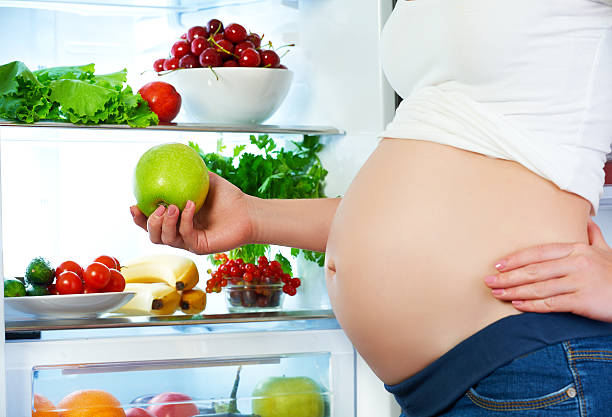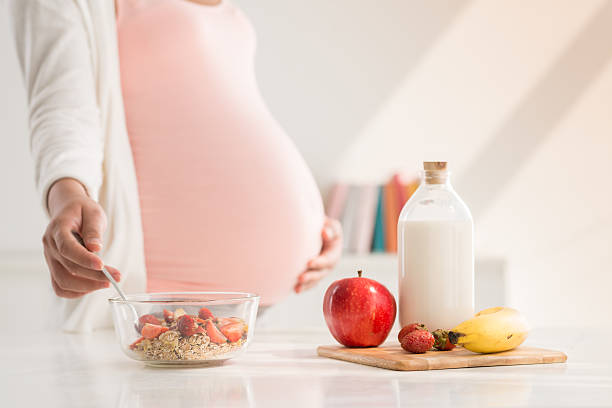Pregnancy is a fascinating time in a woman’s life. But not all realize that even before the confirmation of a pregnancy, the body has already started to undergo significant changes due to the changing hormone profile to accommodate the growing embryo. This may entail the need to improve one’s diet to be able to cope up with the requirements of the developing fetus and the changes in the maternal body processes.
The caloric requirement of pregnant women increases by about 300 kilocalories per day. This includes an adequate amount of macronutrients as well as micronutrients.
Macronutrients include carbohydrates, proteins and fats.
 Protein
Protein
The Institute of Medicine recommends a protein intake of about 1.1 g/kg/day, usually consisting of about 30 % of the total daily caloric requirement. Good sources of protein include lean meat, poultry, legumes, lentils, quinoa, beans, and tofu. An adequate amount of protein is essential for fetal growth. Dietary protein deficiency commonly causes low birth weight infants.
Carbohydrate
The recommended carbohydrate intake increases to about 175 grams per day during pregnancy, that is about 40% of the total daily caloric requirement. Sources of carbohydrates include bread, cereal, pasta, and grains.
Fats
Good fats such as Omega-3-fatty acid are recommended. Trans fat, on the other hand, is reported to cross the placenta and may have adverse effects on fetal growth and development, hence, should be minimized or avoided. Good sources of fat include fish oil, avocado, walnut, almond peanuts, olive oil, and egg.
Micronutrients that have special roles in pregnancy include Iron, Calcium, Folate, Iodine and Vitamin D.
Iron
The recommended Iron intake during pregnancy is 27-30 grams/day. Iron is essential to both the fetus and the mother. It has a role in the fetal and placental development and for the mother to have adequate red blood cell. Iron deficiency anemia is reported to occur in almost 20 percent of pregnant women. Those who are at risk are the vegetarians, underweight, and those who are carrying twins. Iron can be derived from animal protein such as meat, poultry and fish, fortified grains, and multivitamins with iron.
Calcium and Vitamin D
The recommendation during pregnancy is at least 250 mg (1000 mg of elemental calcium) of calcium, and 200-600 international units of Vitamin D. Vitamin D is essential for proper calcium handling in the body. Low vitamin D may cause poor absorption of calcium in the gut and improper storage of calcium in the bone. Hence, achieving normal levels of both calcium and vitamin D is essential. Low Calcium and low Vitamin D are both associated with adverse fetal and maternal outcomes. Calcium is essential in the fetal skeletal development, especially in the third trimester. Reports say that adequate calcium may decrease the risk of the mother to develop a hypertensive disorder during her pregnancy.
 Folate
Folate
Folate is an essential micronutrient in pregnancy. The recommendation is an intake of 400-600 mcg of folate per day. Folic acid deficiency is known to be associated with neural tube defects. Nutritional sources include dark green leafy vegetables, citrus fruits, nuts, and liver. Most prenatal vitamins also contain at least 400 mcg of folate.
Iodine
Iodine deficiency is associated with fetal or maternal low thyroid hormone levels called hypothyroidism. Guidelines recommend a daily intake of at least 150 mcg of Iodine during pregnancy. Pregnant women are encouraged to use iodized salt, eat an adequate serving of seafood and use iodine supplements. But seafood should be taken cautiously because some fish are high in mercury, which should be avoided.
Aside from the mentioned macronutrients and micronutrients, pregnant women are also recommended to have an adequate intake of vitamins A, B, C, E, and zinc. Moreover, high fiber is also important to help reduce constipation which is commonly encountered in pregnancy. Constipation could be due to the compression of the growing fetus on the intestine and a side effect of Iron intake. The recommended fiber during pregnancy is about 28 gms per day.
Eating healthy during this crucial 9 months will not only benefit the mother but the baby as well so choose your food very well and enjoy the journey to motherhood.
Source: Photos taken from gettyimages.com


 (6 votes, average: 4.33 out of 5)
(6 votes, average: 4.33 out of 5)








